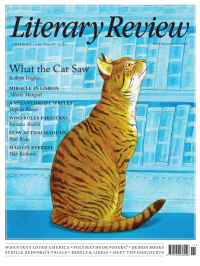Sam Sheldon
Two Plus Two Equals Nothing
When We Cease to Understand the World
By Benjamín Labatut (Translated from Spanish by Adrian Nathan West)
Pushkin Press 192pp £14.99
When We Cease to Understand the World comprises a series of fictionalised biographies of famous mathematicians of the first half of the 20th century. At its centre, taking up more than half of the book, is the story of Heisenberg and Schrödinger and the creation of quantum mechanics. Benjamín Labatut does little to endear them, or any of his other subjects, to the reader, choosing instead to constantly remind us that all of the progress they make brings us nearer to the age of nuclear weaponry. Heisenberg, on the threshold of a breakthrough, has a nightmare in which he is visited by a crowd of people, ‘their bodies sculpted of soot and ash’; Schrödinger outlines his wave equation to the woman he loves and sees her transformed into ‘a black-skinned corpse covered in suppurating wounds and scabs, her tongue lolling from her smiling skull’.
The idea that scientific progress might do more harm than good is well rehearsed, and Labatut occasionally labours the point. When We Cease to Understand the World is, significantly, bookended by the story of Fritz Haber, on the one hand the father of chemical warfare, on the other the man

Sign Up to our newsletter
Receive free articles, highlights from the archive, news, details of prizes, and much more.@Lit_Review
Follow Literary Review on Twitter
Twitter Feed
How to ruin a film - a short guide by @TWHodgkinson:
Thomas W Hodgkinson - There Was No Sorcerer
Thomas W Hodgkinson: There Was No Sorcerer - Box Office Poison: Hollywood’s Story in a Century of Flops by Tim Robey
literaryreview.co.uk
How to ruin a film - a short guide by @TWHodgkinson:
Thomas W Hodgkinson - There Was No Sorcerer
Thomas W Hodgkinson: There Was No Sorcerer - Box Office Poison: Hollywood’s Story in a Century of Flops by Tim Robey
literaryreview.co.uk
Give the gift that lasts all year with a subscription to Literary Review. Save up to 35% on the cover price when you visit us at https://literaryreview.co.uk/subscribe and enter the code 'XMAS24'